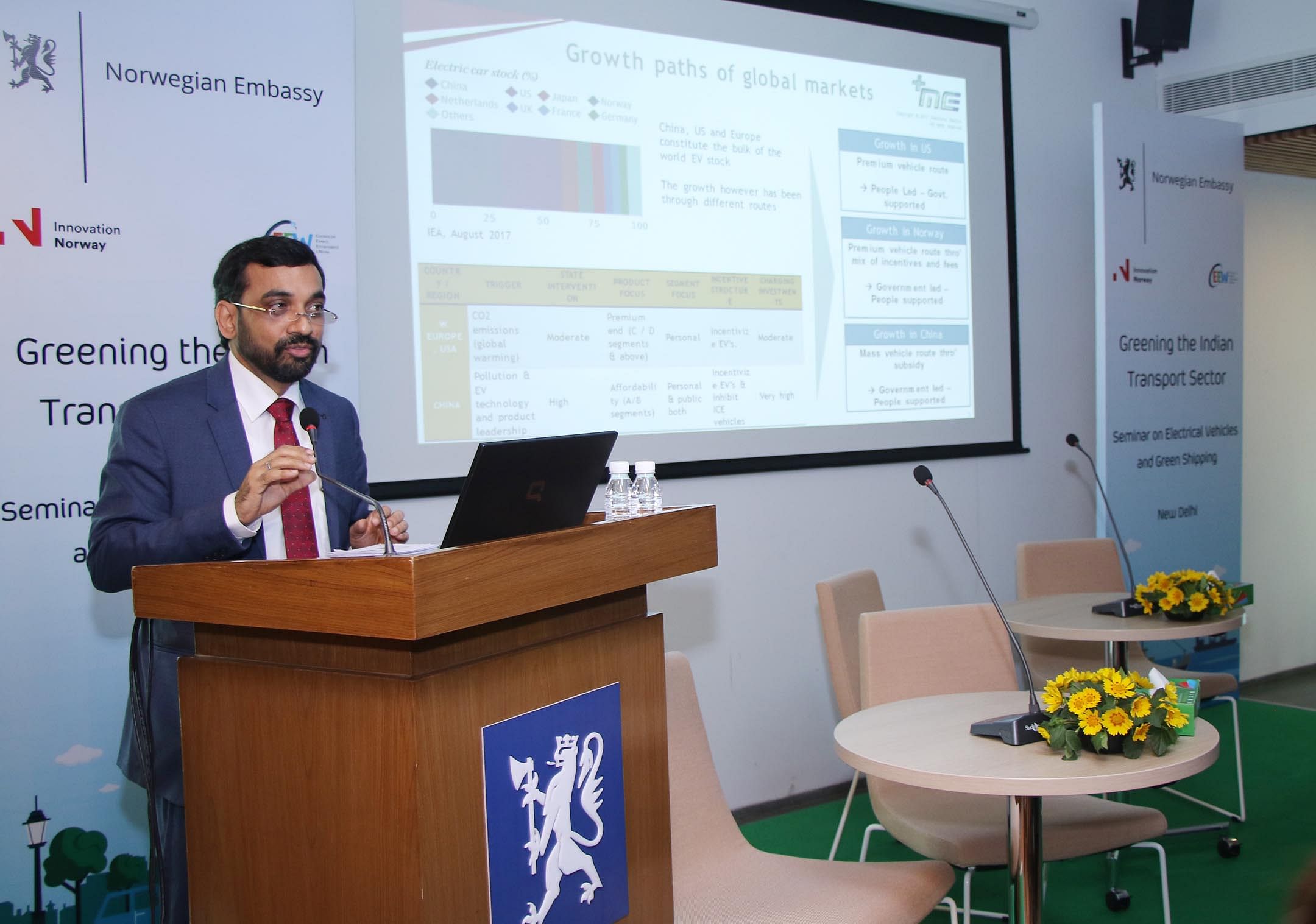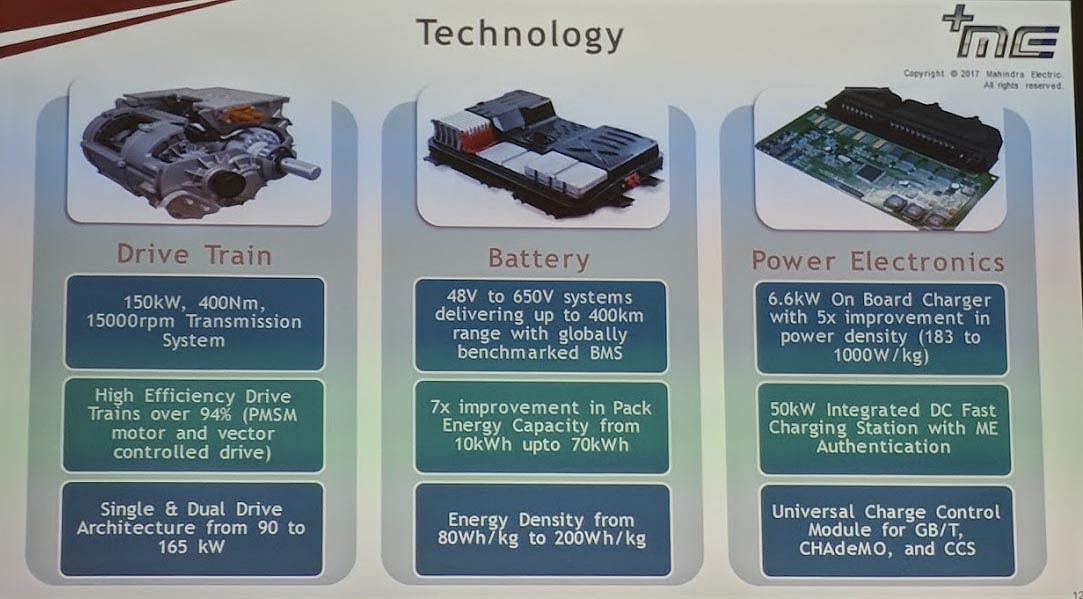Mahindra plots three new EVs by 2019-2020
Mahindra & Mahindra is working on new powertrains, high-density batteries and power electronics. Its new product factory is also learnt to be plotting three all-new EVs.
India, with its low car density (20 per 1,000 people), large spend on oil imports, strong IT and software backbone and high sharing modes for last-mile connectivity, boasts huge potential for EV adoption.
With 70 percent of the Indian population set to move into cities by 2050, the country's cities will face a huge burden of overpopulation, congestion and pollution, which is already at its zenith in some of the key Indian metros, with the capital city New Delhi being a prime example. And with the government going ahead with its ambitious plan to go all-electric by 2030, Mahindra Electric, the pioneer in electric vehicles (EVs) in India believes it has what it takes to make the most of the opportunity.

Speaking at a seminar on electric vehicles and green shipping at the Norwegian Embassy in New Delhi today, Mahesh Babu, CEO, Mahindra Electric (pictured above), said, “The past six months to one year have been especially exciting for EV technology. India finally took a rather bold step in coming up with a direction to move towards complete electrification of all new vehicles by 2030.”
“The past year has also brought out the understanding and made it clear that it is electric technology which is the way forward, not only in India but all over the world. I am hugely bullish on India going forward with electric technology than anyone else. Even considering base volumes, India is set to see a boom in EV sales with 38 percent of total sales coming in from EVs by 2030. This could even go to up to 60 percent in case of hyper-adoption of the technology.”
Many Indian states, including Karnataka, Telangana, Maharashtra and Kerala have already announced EV adoption policies.
“The need for EV component sourcing and setting up of charging stations is going to create a whole new ecosystem around EV technology. Technology, charging infrastructure and government incentives are going to be the key drivers for EV adoption in the country,” said Babu.
“The government's 2030 target is a visionary statement and the trigger to start a new journey. It is not about achieving it, but all about the intent of the government to support and push electric vehicles. The 12 percent subsidy being doled out currently by the government is absolutely sufficient considering the multitude of other issues where the country requires financial assistance. I have no problems with it,” added Babu.
Importantly for the EV industry, battery cost is reducing rapidly. What stood at around US$ 500 per kWh for a battery pack is set to come down to below US$ 100 per kWh between 2021-2025, also improving upon battery density, which is set to go from the current 200Wh/kg to 350-550 Wh/kg by 2030.

Big-ticket investing in EV technology
Mahindra & Mahindra, which has till now invested around Rs 600 crore in the EV business, is set to grow the investment almost eightfold to Rs 4,000 crore over the next 3-5 years across the EV ecosystem.
“We are investing in new powertrains which would produce higher power to the tune of 150kW and 400Nm. These are going to be highly efficient PMSM motor and vector controlled drive systems, taking the efficiency from 80 percent to 94 percent. The powertrains will be available in single and dual drive architecture from 90 to 165kW,” revealed Babu.
“Our focus is also on high density batteries, taking the density from 80Wh/kg to 200Wh/kg with up to seven times the pack energy capacity from 10kWh to 70kWh. These 48V to 650V systems will be capable of delivering real-world range of up to 400km with globally benchmarked BMS (battery management systems),” added Babu.
Power electronics is another key area where the company is developing a 6.6kW on-board charger with up to five times improvement in power density, taking it up from 183 to 1,000W/kg. Also in the pipeline is a 50kW integrated DC fast charging station with Mahindra Electric authentication and a universal charge control module for GB/T, CHAdeMO and CCS.
Three new EVs by 2019-2020
Mahindra Electric, whose stable of EVs currently comprises e20 Plus hatchback, the eVerito sedan and the eSupro commercial van, is hard at work on future products. Expect three new EVs to roll out in a couple of years from now. “We are working on three new products with higher range (between 250-350km) and we will announce them by 2019-2020,” said Babu.
The three new products will likely include a sub-four-metre compact SUV based on the Mahindra KUV100 with a range of 350km as tested by the EPA. The vehicle would be capable of hitting a top speed of 186kph with a 0-100kph time of 9 seconds.
The second product – supposedly based on the SsangYong Tivoli, will be Mahindra’s own iteration of the popular crossover from its Korean subsidiary. It will deliver a real-world range of 250km (tested by NEDC) and boast a top speed of 150kph, with a 0-100kph time of 11 seconds. The e-Tivoli project is very well in the works and according to a recent report by Autocar UK, SsangYong is critically focusing on an electric Tivoli for its electric car program for the coming future. Moreover, Mahindra is also said to be working on a new crossover in close collaboration with SsangYong and the model is slated to be introduced in the Indian market by late 2018.
The third product could be a contemporary crossover based on the XUV Aero Concept showcased at the Auto Expo in 2016 and will have a range of 300km (as per NEDC tests) and will have a 0-100kph time of 8 seconds.
According to Babu, “We are also working on some of the enablers of EV adoption including telematics systems for traffic management, fleet operators, charging infrastructure and drivers. While we would not be developing these directly, we would be supporting these technologies to achieve optimal utilisation of EVs.”
“With India having a unique position in terms of a wide array of commuter vehicle segments, including two-wheelers, three-wheelers and four-wheelers, there is a huge potential for a completely new ecosystem in the electric mobility space and will also give a huge opportunity for entrepreneurs to enter and explore this space in the coming future,” he concluded.
Also read:
Mahindra Electric's aggressive growth plans revealed
RELATED ARTICLES
Cosmo First diversifies into paint protection film and ceramic coatings
The Aurangabad, Maharashtra-based packaging materials supplier is leveraging its competencies in plastic films and speci...
JSW MG Motor India confident of selling 1,000 M9 electric MPVs in first year
The 5.2-metre-long, seven-seater luxury electric MPV, which will be locally assembled at the Halol plant in Gujarat, wil...
Modern Automotives targets 25% CAGR in forged components by FY2031, diversifies into e-3Ws
The Tier-1 component supplier of forged components such as connecting rods, crankshafts, tie-rods, and fork bridges to l...






 06 Dec 2017
06 Dec 2017
 18486 Views
18486 Views





 Autocar Professional Bureau
Autocar Professional Bureau




